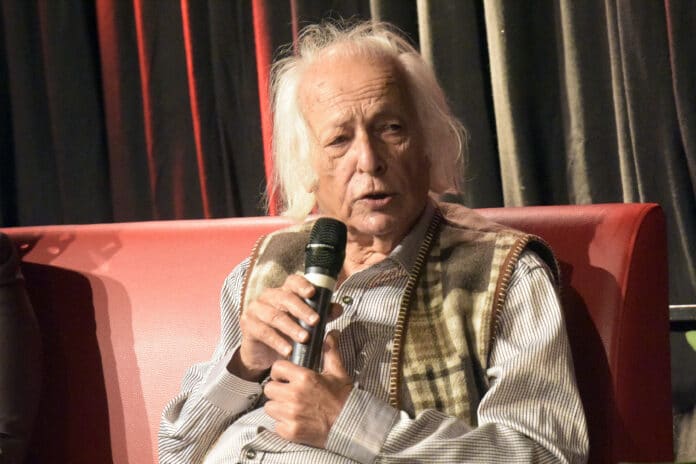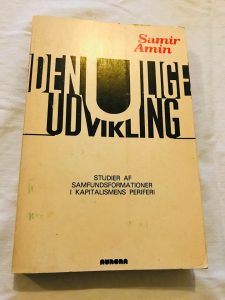
Forord
Marxisten, økonomen og aktivisten Samir Amin blev født i Kairo 3. september 1931 og døde 12. august 2018 i en alder af 86 år. Han var en af de vigtigste kritikere af global kapitalisme og af den moderne verdensorden. Han tog ph.d. i økonomi fra universitetet i Paris 1957 og blev professor i økonomi i 1976.
Samir Amins analyser af den globale udvikling har bidraget til forståelse af den moderne kapitalisme og om kløften mellem Nord og Syd. Han var en fortaler for afhængighedsteorien (se “Dependence theory” på Wikipedia.org) og beskrev indgående, hvordan rigdom strømmer fra periferien til metropolerne.
For Samir Amin var politisk islam ikke et spontant autentisk religiøst ønske fra de berørte befolkninger, men mente, det var en konstruktion af imperialismen og kompradorbourgeoisiet i de berørte områder. Han opfordrede uden held venstrefløjen til at skabe en ny internationale i et forsøg på at bekæmpe den internationale kapitalisme.
Han udgav henved 30 bøger og var rådgiver for flere lande i Afrika, og underviste i økonomi på flere universiteter. Han var medvirkende til at starte sammenslutninger for økonomer og havde flere poster i Third World Forum.
Indhold
Leksika mv.:
- Amin, Samir (Leksikon.org)
- Samir Amin (Wikipedia.org). Med links til andre sprog, bl.a. dansk og længere norske artikel.
Sites mv.
- Texter av den egyptiske ekonomen/forskaren Samir Amin (Marxistarkiv.se). Artikler, bøger og interviews på svensk.
- Samir Amin (Monthly Review). Collection of articles (2000-2018).
- Amin, Samir (Europe Solidaire Sans Frontières). With 25 articles in English and French.
- Celebrating the life of Samir Amin. By Lau Kin Chi (MR Online, September 4, 2020). With 20 contributions + A selection of Samir Amin’s works and videos.
Obituaries / Nekrologer
Notes from the editors (Monthly Review, Vol.70, No.5, October 2018). “The loss of Samir Amin … leaves the world bereft of the greatest single theorist of imperialism of the late twentieth and early twenty-first century, and one of the leading world activists and organizers in today’s anti-imperialist struggle.”
Samir Amin: a lifelong critic of capitalism. By Ken Olende (Socialist Review, Issue 438, September 2018). “Unlike many of his contemporaries he did not retreat from radicalism with the collapse of the ‘communist’ east. In the period since the millennium he threw himself into the World Social Forum.”
A rebel in the Marxist citadel: tributes to Samir Amin (Review of African Political Economy, 16-19 August 2018). With obituries by Issa Shivji, Peter Lawrence, John S. Saul, Natasha Issa Shivji, Ray Bush and Ndongo Samba Sylla.
Africa’s pioneering Marxist political economist, Samir Amin (1931-2018). By Patrick Bond (CounterPunch, August 17, 2018). “Alongside extraordinary contributions to applied political-economic theory beginning sixty years ago, Amin’s unabashed Third Worldist advocacy was channelled through unparalleled scholarly entrepreneurship when establishing surprisingly durable research institutions.”
Obituary: Samir Amin, the ‘creative Marxist’. By Mohammed Saad (Ahram Online, 14 August 2018). “Late economist Samir Amin, a brilliant mind that earned the description of the ‘Radical Economist.”
Death of a Marxist. By Vijay Prashad (The Hindu, August 14, 2018). “Egyptian economist Samir Amin observed the dangers of our world but also its possibilities.”
Samir Amin, dependency theory, and the multipolar world. By Louis Proyect (The Unrepentant Marxist, August 14, 2018). ” Amin is well-known as a dependency theorist and advocate of a multipolar world. Since I am both a dependency theorist after a fashion and a critic of multipolarity, at least as it is understood by most of the left, this forces me to come to terms with Amin’s legacy …”
In memoriam: Samir Amin. By Prabhat Patnaik (IDEAs network, August 13, 2018). “Two characteristics set Samir Amin apart from most other Marxist intellectuals of his time. One was his total and absolute commitment to praxis for the cause of socialism … The second characteristic was the centrality he accorded to imperialism in his Marxist analysis …”
Samir Amin: a vital challenge to dispossession (Red Pepper, August 13, 2018). “Nick Dearden looks at the theories of one of Africa’s greatest radical thinkers.”
Samir Amin stood for people. By Farooque Chowdhury (Counter Currents, August 13, 2018). “Samir Amin, one of the foremost Marxist theoreticians in contemporary world, was a communist.”
Artikler på dansk / norsk:
For dannelsen af en transnational alliance af arbejdere og undertrykte folk (Solidaritet.dk/Kritisk Revy, 14. maj 2021). “Kort før sin død den 12. august 2018 udarbejdede Samir Amin i samarbejde med Firoze Manji nedenstående dokument, han håbede ville blive vidt udbredt.”
Samir Amin: Afsked med en marxist. Af Alfred Lang (Autonom Infoservice, 15. august 2018). “Som leder af ‘Forum Tiers Monde‘ i Dakar, Senegal, var Amin i mange år en af de fremmeste fortalere for postkolonialistisk befrielse via fri-gørelse fra den globale frihandel.”
Samir Amin og “den reelt eksisterende kapitalismen”. Av Tore Linné Eriksen (Gnist: Marxistisk Tidsskrift, nr.3, 2018, s.86-97). “… en av vår tids viktigste – og uten tvil mest allsidige – tenkere innenfor den marxistiske tradisjonen. Selv om han bar flere professortitler, var aldri universitetenes elfenbeinstårn hans foretrukne arena; han var en revolusjonær aktivist helt til det siste.” Se også ibid.: Hvorfor lese Samir Amin? Et biografisk og bibliografisk riss (Marxisme.no, 2014) + ibid.: Samir Amins sidste ord (Gnist, nr.4, 2020).
Verda sett frå Sør (Gnist/Rødt! Marxistisk Tidsskrift, nr.4a, 2012). “Irene León har intervjua Samir Amin, og konsenterer seg om tri beslekta spørsmål: Ditt syn på verda og sjansane for å endre ho – Korleis du definerer samanbrotet i kapitalismen begrepsmessig og politisk, og sjansen for frikopling frå kapitalismen – Di analyse av samanhengen i stoda globalt, sett frå Afrika og Midtausten.”
Dristighet, mer dristighet! Av Samir Amin (Gnist/Rødt! Marxistisk Tidsskrift, nr.2, 2012). ” De historiske omstendighetene som er skapt av at den internasjonale kapitalismen faller sammen, krever at den radikale venstresida, både i nord og sør, er dristig når det gjelder å formulere sine radikale alternativer til det eksisterende systemet.”
Samir Amin og spændingsfelterne i den generaliserede monopolkapitalisme (pdf). Af Karen Helveg Petersen (Det Ny Clarté, nr.20, august 2012, s.28-33). “Artiklen er baseret på Samir Amins offentlige optræden på Transform-konferencen i København d. 17.-18. marts og på forfatterens (KHPs) samtaler med Samir Amin ved den lejlighed, senere telefonkontakt samt fortrinsvis nyere publikationer af Amin.” Scroll ned.
Tiden er ikke til sociale kompromisser. Af Torkil Lauesen (Gaia, nr.72, forår 2012, s.14-18).
“Proletariatet i centerlandene har historisk har fået en stigende realløn i takt med deres produktivitet. De har stort set accepteret den socialdemokratiske samfundsmodel, og det er ikke herfra, forandringen skal komme. Motivationen skal vi i stedet netop finde hos de millioner af mennesker, som producerer varerne til den høje vestlige levestandard: proletariatet i periferien. De er super-udbyttede, fordi der ingen forbindelse er mellem deres løn og deres produktivitet.” Scroll ned.
Imperialismens udnyttelse af den politiske islam. Af Samir Amin (Kritisk Debat, 17. marts 2011; online på Internet Archive). “Politisk islam er ikke kun reaktionær i forhold til enkelte spørgsmål (især angående kvinders status i samfundet) … den er fundamental reaktionær og kan derfor selvsagt ikke medvirke til at fremme menneskers frigørelse.”
Den kollektive imperialisme. Af Samir Amin (Gaia, nr.47, vinter 2004, s.4-9; online på Internet Archive). “Med baggrund i Bush’s genvalg bringer vi denne analyse af Samir Amin om forholdet mellem USA og resten af verden. I et historisk perspektiv trækker Amin de store linier op og ser særligt på USA’s relationer til Europa.”
Articles in English:
Onward to liberation! — Samir Amin and the study of world historical capitalism (pdf). By Salimah Valiani (Journal of World-Systems Research, Vol.27, No.2, Summer-Autumn 2021, 566-585). “It is argued that Samir Amin was central to sparking the study of world historical analysis, and offered unique contributions to the discussions that emerged.”
Only People Make Their Own History: Writings on Capitalism, Imperialism, and Revolution. By John McKay (Marx & Philosophy Review of Books, 18 July 2020). Review of Samir Amin’s book (Monthly Review Press, 2019, 246 p.). “The book contains 13 papers published in the Monthly Review [2012-18]. An introduction to the volume by Amin’s friend and colleague, the Marxist philosopher Aijaz Ahmad, provides a short summary of Amin’s life and career and puts his ideas into their broader context.”
‘There is a structural crisis of capitalism’ (Frontline, May 11, 2018; online at Internet Archive). “In this in-depth interview from Dakar, the 86-year-old Amin speaks on a wide range of topics: globalisation; generalised monopoly capital; the alarming growth of inequality; the role of the state in the neoliberal era; globalisation and delinking; capitalism and modernity; the return of fascism in the contemporary capitalist world; the rise of the Left …”
Zone of storms. By Theo V. Kenji (MR Online, April 22, 2018). Review of Samir Amin’s, October 1917: Revolution A Century Later (Daraja Press, 2017, 124 p.): “The ambitious breadth of Amin’s book precludes any comprehensive history of the October revolution, and in fact the revolution is discussed little if at all.”
Samir Amin’s Russian campist anti-imperialism. By Dan La Botz (New Politics, Issue 62, Winter 2017). Review of Samir Amin, Russia and the Long Transition from Capitalism to Socialism (Monthly Review Press, 2016, 142 p.): “This book is written expansively at the geopolitical level, more concerned with nation-states than with their internal politics or their social classes … Amin’s logic places him on the side of undemocratic and aggressive states against ‘the people’ …”
Revolutionary change in Africa: an interview with Samir Amin (Review of African Political Economy, 16 March 2017). ROAPE’s Leo Zeilig interviewed Samir Amin in Dakar on 5 February 2017: “In this interview Amin reflects on a life spent at the cutting edge of radical theory and practice, African politics and the legacy of the Russian revolution.”
Samir Amin at 80: An introduction and tribute. By John Bellamy Foster (Monthly Review, Vol.63, No.5, October 2011). “The theory of worldwide value is Amin’s signal economic contribution, summing up as it does the system of unequal exchange/imperial rent that divides the global North and the global South.”
Political Islam in the Service of Imperialism. By Samir Amin (Monthly Review, December 1, 2007). “The region of the Greater Middle East is today central in the conflict between the imperialist leader and the peoples of the entire world. To defeat the Washington establishment’s project is the condition for providing the possibility of success for advances in any region of the world. Failing that, all these advances will remain vulnerable in the extreme.”
Videos
Samir Amin: The organic intellectual. Director Aziz Salmone Fall. Introduction + the film online at MR Online (2019, 1:11:14 min.). “Taking as its point of departure this observation, itself a feature of 50 books by Samir Amin, the film depicts the audacious struggles of, as well as interviews with, addresses by and special moments involving this most outstanding intellectual of the South.” See also the film at YouTube (71 min.), with speech/text in French and English.
Samir Amin revolutionized economics by centering the Global South. TRNN’s Ben Norton explores the radical legacy of the Egyptian-French anti-imperialist Marxist with scholar Ali Kadri. The Real News Discusses the legacy of Samir Amin (YouTube, 16:59 min.).
“In this interview conducted in Beijing on 12 October 2015, Samir Amin talked to Lau Kin Chi and Auyeung Lai Seung about his position as a communist, narrating the history of the communist movements including the debates and politics since Bandung 1955. He also talked about the circumstances under which he left Egypt in 1960 and returned in 1981. He commented on China’s foreign policies, he discussed what he meant by “de-linking”, and lastly, he spoke about happy and sad moments of his life.” (Youtube, 1.28:28 time)
Literature:
Samir Amin: Publications (Wikipedia.org)
Samir Amin: A Life Looking Forward: Memoirs of an Independent Marxist (Zed Books, 2006, 266 p.)
Samir Amin: theorising underdevelopment’. Chapter 9 in: David Renton: Dissident Marxism: Past Voices for Present Times (Zed Books, 2004, p.184-204 + 257-259)
Samir Amin: Imperialismens nye ansigt og det globale kaos (Solidaritet, 1994, 30 s.)
Samir Amin: Den arabiske økonomi (Aurora, 1982, 127 s.). Med efterskrift af Gorm Rye Olsen: ‘Klasseinteresser, styreformer og udenrigspolitik i arabiske samfund’ (s.89-127)
Samir Amin: Den ulige udvikling: studier af samfundsformationer i kapitalismens periferi (Aurora, 1979, 329 s.)
Samir Amin: Den globala kapitalackumulationen: En kritik av teorin om underutvecklingen (Zenit/Rabén och Sjögren, 1974, 249 s.; online på Marxistarkiv.se)
Ahmad El Kodsy [i.e. Samir Amin]: Nationalisme og klassekamp i den arabiske verden (Politisk Revy, 1971, 88 s.)

Se også på Socialistisk Bibliotek:
- Emneoversigten Marxisme / Marxism
- Emneoversigten Økonomi / Economy


































